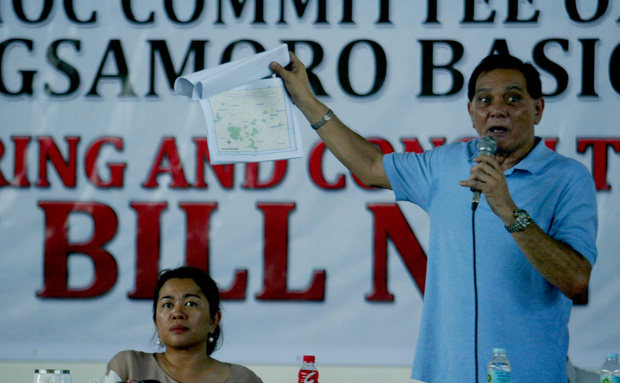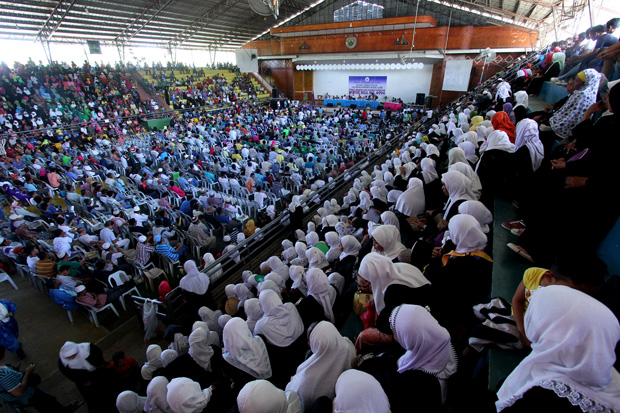MIDSAYAP, North Cotabato (MindaNews/13 December) — Questions on the possible implications of including 39 barangays in North Cotabato in the Bangsamoro dominated the House public hearing on the Bangsamoro Basic Law (BBL) in this town Friday.
The 39 barangays belong to the municipalities of Aleosan, Carmen, Kabacan, Midsayap, Pigcawayan and Pikit, which voted for inclusion in the Autonomous Region in Muslim Mindanao during the 2001 plebiscite. Some of these barangays are not contiguous to the ARMM.
 Zamboanga City Rep. Celso Lobregat shows a map of the 39 barangays in North Cotabato that are part of the proposed Bangsamoro territory during the public hearing on the Bangsamoro Basic Law in Midsayap, North Cotabato on Friday. Beside him is North Cotabato Gov. Emmylou Talino-Mendoza. Mindanews Photo by Keith Bacongco
Zamboanga City Rep. Celso Lobregat shows a map of the 39 barangays in North Cotabato that are part of the proposed Bangsamoro territory during the public hearing on the Bangsamoro Basic Law in Midsayap, North Cotabato on Friday. Beside him is North Cotabato Gov. Emmylou Talino-Mendoza. Mindanews Photo by Keith Bacongco
Zamboanga City Rep. Celso Lobregat said the inclusion of the 39 barangays is perhaps the most crucial for the province because it is not allowed in the constitution.
Lobregat argued it cannot be done unless the entire province votes yes for their inclusion in the Bangsamoro region.
He cited Article 10, Section 10 of the constitution that states: “No province, city, municipality, or barangay may be created, divided, merged, abolished, or its boundary substantially altered, except in accordance with the criteria established in the local government code and subject to approval by a majority of the votes cast in a plebiscite in the political units directly affected.”
But while Lobregat said the issue may cause problems for the BBL, he conceded before the predominantly Moro audience that the bill would be passed “because they have the numbers”. The crowd applauded his statement.
Lobregat pointed out that not all of the 39 barangays are contiguous, citing barangay Manarapan in Carmen which sits in the middle of the municipality.
“If you need help, where will you go since you will no longer be part of North Cotabato? Where will you run to? They will say, the Bangsamoro Parliament will change the law and only then will they say where you belong,” he said in Filipino.
“Hindi sigurista yan, that is your right,” he said, adding they may or may not join the Bangsamoro.
His statement drew both applause and jeers from the crowd.
“Karapatan nyo na pumalakpak, karapatan nyo na mag-boo,” Lobregat gamely shot back.
Opt in, opt out
Alamada Vice Mayor Samuel Alim clarified if it is possible for a municipality to opt out after it has joined the Bangsamoro.
Government peace panel chair Miriam Coronel-Ferrer responded: “Mas mahirap sumali ang hindi kasali at mas mahirap lumabas kapag nakasali” (Harder to join if you’re not included, and harder to go out if you’re included).
During the hearing in Davao City, the local government of Wao in Lanao del Sur appealed to the House ad hoc committee on the BBL to hold a plebiscite in their municipality because they wanted to opt out of the ARMM.
Town councilor Al Belotendos told Mindanews that should they opt out, they wanted to be a part of North Cotabato.
“But we will not insist on the plebiscite just in case it will not be granted. What is important is that we are showing our position now so that we will not be blamed as well when Bangsamoro government fails, Belotendos explained.
Most critical
While acknowledging that the public hearing here is perhaps the liveliest and well attended, members of the House of the Representatives also admitted that the crowd was the most critical.
 At least 1,500 people have gathered for the Bangsamoro Basic Law in Midsayap, North Cotabato on Friday, making it the biggest attendance among the series of public hearings accordig to the members the House of Representatives. Mindanews Photo by Keith Bacongco
At least 1,500 people have gathered for the Bangsamoro Basic Law in Midsayap, North Cotabato on Friday, making it the biggest attendance among the series of public hearings accordig to the members the House of Representatives. Mindanews Photo by Keith Bacongco
Apparently, this was caused by the fears of many in the First District of the province that the proposed law may suffer the same fate as the botched Memorandum Agreement on Ancestral Domain (MOA-AD) in 2008, which led to renewed war and displacements after it was declared unconstitutional by the Supreme Court.
Lawyer Roland Jungco, a member of the municipal council here, said that some provisions of the proposed law must be explained well to the common people before it will be passed.
“I have read this but I have some confusion in the law even if I’m a lawyer, how much more the ordinary people?” Jungco said.
While the local government is willing to campaign for the passage of the BBL, he added they have yet to clarify some provisions in the proposed law. “How can we campaign and convince people about something that we don’t understand. Because we can’t get rid of legal issues.”
The town official asked ad hoc committee chair Rep. Rufus Rodriguez of Cagayan de Oro City to let Lobregat clarify some of his questions.
Jungco cited Article XV, Section 6 of the BBL, which reads: “Plebiscite Question. The question to be asked of the voters in the plebiscite shall be as follows: ‘Do you approve of the Bangsamoro Basic Law?’”
Lobregat said this question should only be asked to voters in the ARMM. Speaking in Filipino, he suggested that the question for those outside of the ARMM should be “Do you want to join the Bangsamoro?”
But Jungco said that that question would be misleading.
Asked by Jungco if he was confused with the BBL, Lobregat chuckled and said: “Medyo na-confuse.”
Lobregat said that if the proposed law contains provisions that are believed to be unconstitutional, then it should be clarified now before it is ratified.
As in the other public hearings, the lawmaker from Zamboanga City also asked the crowd in the local dialect if they wanted peace. The crowd cheered and raised their hands.
But when he asked who among them have read the Comprehensive Agreement on the Bangsamoro, the four Annexes and the BBL, only a fewpeople raised their hands.
Unlike MOA-AD
North Cotabato First District Rep. Jesus Sacdalan said the BLL will not suffer the fate of the MOA-AD.
Lobregat and Sacdalan, who was then the provincial governor, were among those who questioned the constitutionality of the MOA-AD before the Supreme Court.
At least 1,500 people gathered inside the municipal gymnasium for the 29th public hearing and consultation of the BBL. Some local government officials from the nearby towns and a few representatives of indigenous peoples in the province also attended.
Zaynab Ampatuan, executive director of Moro Peoples Core, expressed confidence the BBL would be passed, saying the consultation process has been comprehensive unlike the MOA-AD which was kept from the public.
“This is better because the gray areas are now being discussed and they are listening to the voices of the people on the ground,” Ampatuan told Mindanews. (Keith Bacongco / Mindanews)
